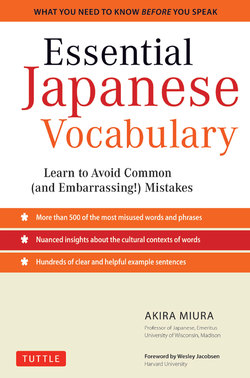Читать книгу Essential Japanese Vocabulary - Akira Miura - Страница 7
На сайте Литреса книга снята с продажи.
ОглавлениеPreface
I taught Japanese to Americans for more than thirty-five years. During that time I observed a large number of errors in Japanese made by my American students. Most of those errors were due to the students’ insufficient mastery of Japanese grammar (for example, their inability to inflect verbs correctly or to use appropriate particles), but there were also at least as many errors that are basically attributable to vocabulary problems.
When the American student of Japanese first comes across a new Japanese word, it is usually introduced with an English translation, which is considered the “equivalent,” e.g., atatakai 暖かい is matched up with “warm.” The student is therefore very likely to conclude that there is in fact a one-to-one correspondence between the two words, and he or she does indeed start using atatakai, for example, in all situations where “warm” would be called for in English. The student might thus say to a Japanese friend in the middle of summer, with the mercury hitting the mid-eighties, Kyō wa atatakai desu nē 今日は暖かいですねえ “It’s warm today, isn’t it!” That would really baffle the poor Japanese friend because, in Japanese, temperatures that high are not atatakai but atsui 暑い “hot.” Atatakai most aptly describes a nice spring day that arrives after the cold months of winter.
Essential Japanese Vocabulary combines the two volumes of my Japanese Words & Their Uses, which were originally published separately. It is designed to provide help for American students, especially those at the elementary and intermediate levels, by explaining approximately five hundred Japanese words and phrases and their usages. It explains not only how they are used but also how they should not be used. Whenever possible, I’ve contrasted Japanese terms with their English counterparts. Many of the errors cited in this volume were actually committed by my own students (although they are not always quoted verbatim).
There are just as many synonyms in Japanese as there are in English, and they also may create problems for students of Japanese. For example, both binbō 貧乏 and mazushii 貧しい mean “poor,” but they differ in usage. In this book, I have included a number of synonyms like that, with sample sentences as well as explanations of their differences.
If American and other English-speaking students of Japanese can find solutions to some of their problems in mastering basic vocabulary with the aid of this book, I will be more than happy. It is also my hope that teachers of Japanese working with English-speaking students may find the explanations and examples helpful for their own classes. I would like to express my appreciation to the Australian National University, which awarded me a research grant that enabled me to continue writing the manuscript. Thanks are also due to my wife, Charlotte, who proofread the final draft for me.
AKIRA MIURA
